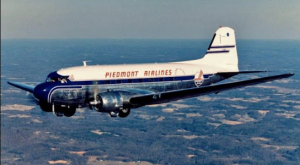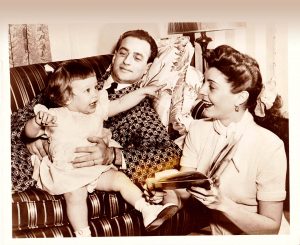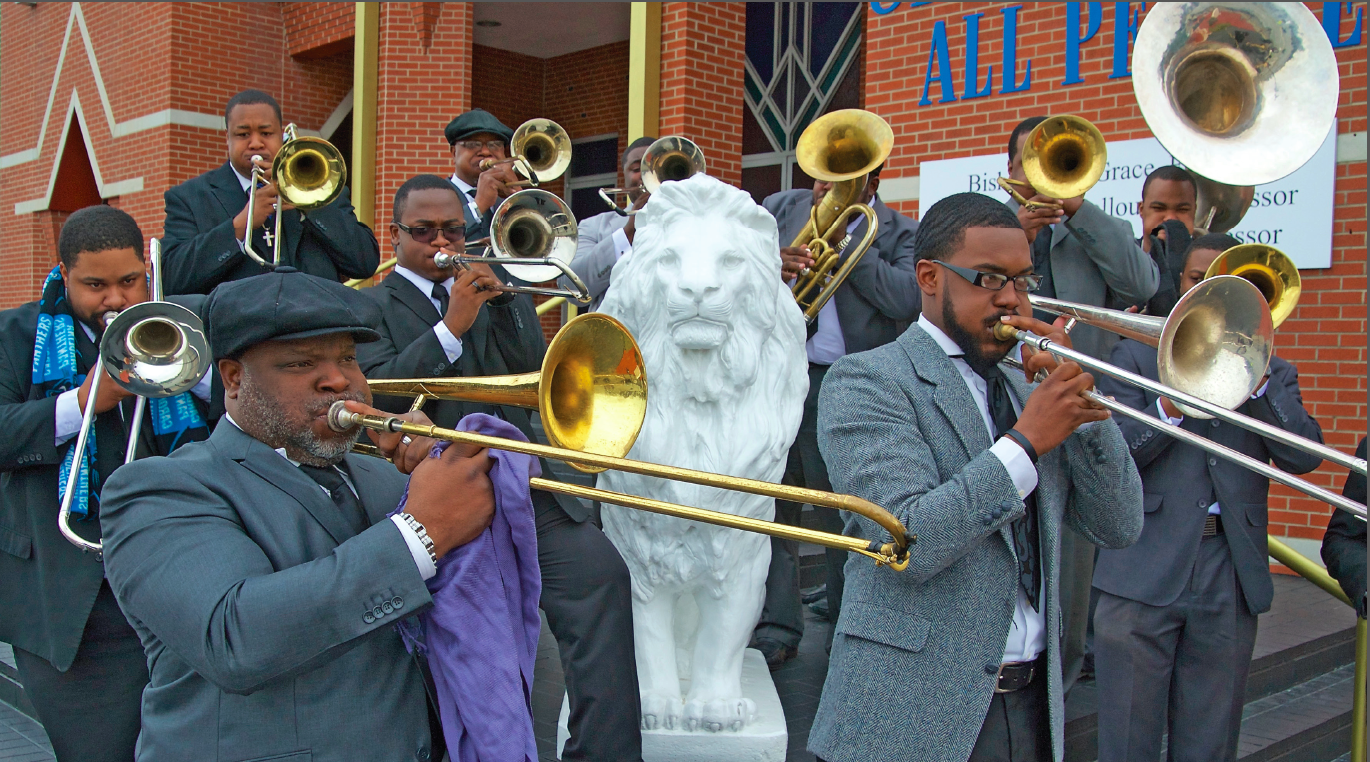
At Greensboro’s United House Of Prayer for All People, the Madison Heavenly Sounds Trombone Shout band lifts the spirit and feeds the soul
This story originally appeared in O.Henry magazine in March 2016.
By Grant Britt • Photography By Sam Froelich
The music hits you with a punch to the heart. Like a gospel freight train thrumming down the rails, it makes everything in the surrounding area vibrate with the brassy rhythm. Band members and audience alike bounce to the beat. You can’t keep still — the sound permeates your body as it vibrates up your breastbone, tickling your spine. As trombone slides reach for the heavens, Greensboro’s United House of Prayer for All People swells to the strains of the Madison Heavenly Sounds Trombone Shout band, and all heaven is breaking loose.
Under the leadership of House Of Prayer founder Charles Manuel “Sweet Daddy” Grace, switching out the organ in church services for brass instruments first came into vogue in the late 1920s. The Cape Verde native, whose first church was founded in Charlotte in 1926, had a lone trombonist with him at first. But as Grace sought a way to attract people to his services, he added brass bands. These were originally driven through town on a flatbed truck to attract crowds to hear Grace’s message
The bands also created another House of Prayer tradition: The kitchens found in every HOP today. “Daddy Grace started this because in the ’20s people didn’t have jobs or food; there was no welfare, no food stamps, no Social Security, so he started a
food program,” says Apostle H.M. Swaringer, who presides over the Greensboro church. “He would have soup kitchens, and people would line up and come in and get their bowl of soup and their bread. His ideology was a hungry man doesn’t want to hear about the word of God. Feed a man’s belly and you can talk to his soul.”
At a recent HOP service, there did seem to be a lot of well-fed souls in attendance. The spirit was being heard, and it moved your heart, your soul and your feet. There’s no mystery as to why they call these horn-wielding praise bearers a shout band. When this music starts to swell, it lifts you up, encouraging you to shout and dance.
Leader Andrew Kittrell fronts this brass furnace, blasting high-pitched praise to the heavens. As the band swells behind him, the congregation is buoyed up on pulsating waves of worship. The band currently has as many as seventeen members. I witnessed seven ’bones, a tuba, sousaphone and two drummers, snare and a kick making a joyful noise no one could ignore. You feel the floor vibrating beneath your feet as the band takes it up a notch. Kittrell hollers “Thank you, Daddy,” as the spirit moves him, and many members of the congregation at the Cathedral on Dudley Street join him, dancing and shouting in the spirit.
The service is truly an all-ages event. Even the smallest kids in the congregation are fully engaged in the proceedings, many already in training for future musical service. The church takes a unique approach to getting children interested in the music with what they call fist bands. The children emulate the instruments with their hands, arms and lips. “They ball up one fist, and since we use tubas and trombones, they turn their arm up over their head as the bass horn, and that’s how they learn how to play their instrument,” Swaringer says.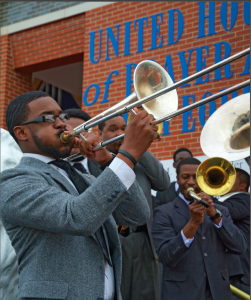
Children as young as 3 blow into their fists at first, making the sounds of the horn while pumping an arm like a trombone slide or pressing imaginary tuba keys. As they get older, kids are given a mouthpiece from a ’bone or tuba to practice on before graduating to an actual instrument. “They hear the sounds, and that sound is embedded in them, until by the time they are seven or eight they can play an instrument as good as a person who has been taking music all their lives,” Swaringer adds. Reading music is not a requirement, and few band members do, playing entirely by ear. “Reading music is phenomenal,” Kittrell says, “but to have the gift of playing by ear is unbelievable. It’s a gift from God.”
“Run man” Khari Mincey, who also plays an important role in the band, doesn’t read music either. “It’s an extension of your voice,” he says of his instrument. “My dad used to tell me all the time, ‘If you can sing a note, you can play a note.’” Born and raised in the church, Mincey started playing when he was age 4. “When you play, you’re projecting yourself,” Mincey says. “That’s you, through an instrument.” His “run man” duties include playing three- or four-part harmony, being in the background and keeping everything under control. Swaringer, who played in New York City’s HOP shout band, says the run man’s main duty is to keep the band moving as the bass element.
“The bass does all the turning,” Swaringer says. “Bass — he calls, and he carries ’em into it, and the rest follow . . . and that’s the way it is.” The band is a family tradition for many members. Kittrell’s grandfather, Preston Kittrell, was told by Daddy Grace to come back from Virginia to Greensboro to start a band. “When he was told to go back to Greensboro in the ’30s to start a band, he came back as one trombone player,” Swaringer says. “And out of that one birth of trombone they got a band.”
It’s a unique sound. Swaringer says some folks compare it to New Orleans brass bands, but he says HOP has a more upscale, African beat. Crescent City brass bands make you want to strut, the shout bands have a swooping glide, the horns slithering around underneath the melody with a slippery rhythm dominated by bass and drums that makes you jump and shout. The leader and most of the players play the trombone like a trumpet, like an entire choir of Fred Wesleys, James Brown’s former bandleader who pioneered high-pitched funk trombone. It’s for edification, jubilation, for people to respond, and it lifts a burden off them,” the Apostle says. “It’s a spiritual thing that lifts you up rather than puts you down.”
And because the members play by ear, there’s no sheet music to go by, so no performance is ever the same. They can’t play the same thing twice because they’re taught it’s not about what you hear, it’s about what you feel. Swaringer contends that aspect confounded some of the greats of jazz who saw the bands perform.
The Apollo Theater was right across 125th Street in Harlem from the House of Prayer Swaringer attended, and he says it wasn’t unusual for performers to stop in and listen to the band after their gigs at the famed venue. Swaringer claims the band even impressed the likes of Dizzy Gillespie and Miles Davis. “They would try to write down what they were hearing, but they could never get it,” he recalls. “And they would talk about it: ‘How do you guys do that? And they would come back the next night, and the band would play, and they wouldn’t play nothing they had played the night before, and they’d be going, ‘Where did that come from?’”
The Apostle says it was more than the music that drew them: “One reason they would come to the House of Prayer was that they couldn’t eat in the places they were playing,” Swaringer says. “The HOP had food, and they would come up there to eat their dinners cause the HOP’s service wouldn’t get out till 2 or 3 o’clock in the morning.”
But at the House of Prayer, both belly and soul are catered to equally. “The band in the church plays the most important part,”
Swaringer says. “They’re in the beginning of the service, the middle, at the end. If the choir sings a song, when they finish, to enhance that, they are the sugar in the coffee, they are the sweetness in the tea, they enhance the meal. I’ve given them the bread, now here comes the dessert, the music that comes afterward.”
But the Apostle wants folks to know the band is much more than musical caterers. “The philosophy and the doctrine of this church is to save our young men. We use our musicians to teach our kids, and as a way of keeping our children out of harm’s way,” he says. “When you have a band, twenty or thirty young black men and they are serving God, that shows people in the community that all our black men are not thugs and gangstas.”
Although the band’s venue is in the sanctuary, they do occasionally play in public, as well. The shout band Swaringer was a member of in New York toured the world, playing Spain, Belgium and the Opera House in Sydney, Australia. “Those people had never heard of gospel, period,” he says of the aria-loving Aussie audience. “They’d never heard anything like that. We turned that place out. We just took ’em to church.”
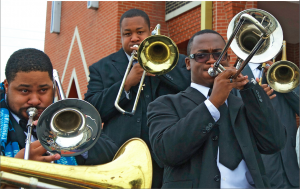 The New York–based shout band also played the White House, The Smithsonian and Kennedy Center. His dad’s shout band played Carnegie Hall.
The New York–based shout band also played the White House, The Smithsonian and Kennedy Center. His dad’s shout band played Carnegie Hall.
The Madison Heavenly Sounds have played out-of-town gigs at other churches as well as the local Festival of Lights, and are in negotiations to join the lineup for both The National Folk Festival and 17Days. Anyone is welcome to attend the Sunday morning services, but if you want a taste of what the shouting is all about in a more casual setting, the Apostle has a surprise in store — for the band as well as the public.
“They don’t know they’re doing rehearsals on Fridays, yet,” the pastor says slyly, as Kittrell and Mincey receive this new blessing, heads bowed. “When the weather breaks, they’re going to be across the street [in the church parking lot] doing barbecues.” Meanwhile, the band will host some open-air rehearsals. That way those who come will not only be entertained, “They’ll also get the barbecue and the fish.” Now that’s truly a blessing worth shouting about.
In a future edition of O.Henry, writer Grant Britt will recall his own days of reaching for the heavens with his horn in the Key West Funeral Band. In the meantime, he rumbles about music from his memento-crammed Greensboro abode, tooting his own horn for various and sundry publications.



